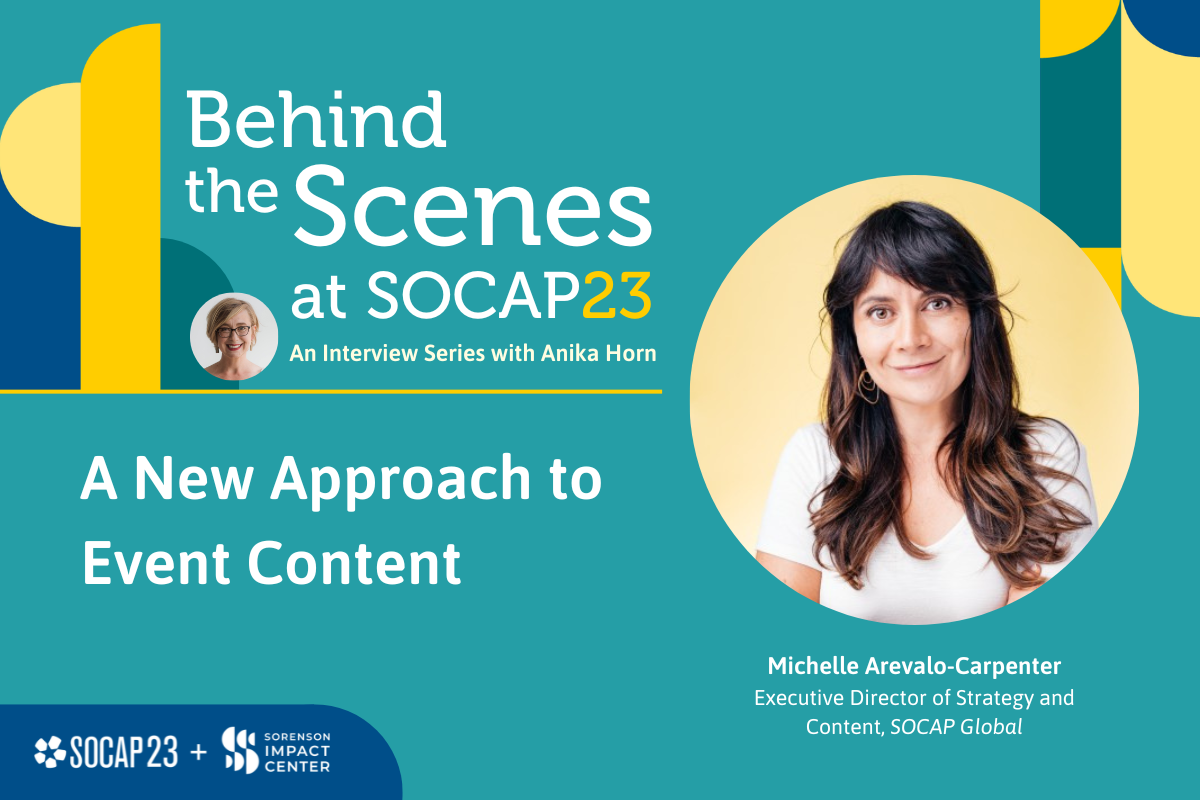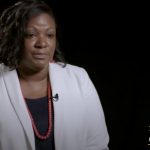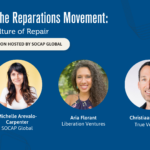This is the first installment of our SOCAP Behind the Scenes interview series. In this series, members of the SOCAP team openly share how it is approaching this year’s event, building on the event’s legacy with an approach designed to meet the current needs of the impact community — and see around corners to the future of the global impact movement. To get the behind-the-scenes scoop on how SOCAP is rethinking how to engage the impact community’s expertise in the content curation for its fall convening, I sat down with Michelle Arevalo-Carpenter, Executive Director of Strategy and Content. Prior to joining the SOCAP team in early 2023, Michelle worked as a human rights lawyer and helped develop the ecosystem for impact entrepreneurs in South America, based in her home country, Ecuador. A community-builder and a convener at heart, Michelle also organized the annual NEXUS Latin America CLIIQ Summit and knows the importance of intentional content creation and curation at global convenings for impact makers.
SOCAP has a history of taking innovative approaches to content curation. Years ago, the conference organizers launched SOCAP Open, a crowdsourced process for session submissions that has become popular over the years.
This year, SOCAP is introducing a new concept for shaping and guiding sessions that make it to the agenda. Content Curation Councils consist of experts and practitioners who understand the pulse of the global dialogue around topics at the intersection of money and meaning. Representing different geographies, sectors, and professions, Content Curation Council members will work with the SOCAP content team to help define the track’s direction, select SOCAP Open submissions, and develop sessions that address the field’s most pressing challenges.
In this Behind the Scenes at SOCAP23 interview, Michelle provides a transparent overview of the plans for programming and content selection at SOCAP23, set for Oct. 23-25 at Yerba Buena Center for the Arts in San Francisco.
What inspired you to take a new approach to content curation for SOCAP23?
In thinking about how I wanted to show up in my new role, I decided early on that I would look at SOCAP’s content with a beginner’s eyes: both ready to learn from those that built this community and also free to ask even the most basic questions.
I realized that there was hunger for a fresh perspective on how to convene our vast global community in meaningful ways. So, within the SOCAP team, we considered how we might curate content that reflects different levels of experiences, scale, and geographies without losing the familiarity and proximity of like-minded changemakers who already are SOCAP fans. SOCAP has become a big event thanks to the committed leaders who have built it before me. The event means so much to so many different people. So, we understood that all these aspects would be difficult to balance.
How do you strike that balance? And how did it evolve into a strategy for SOCAP23?
During my first month, I went on a listening tour and spoke with a number of people including those who had never been to SOCAP, the super fans, and some who used to join but had stopped coming. What I heard was this: SOCAP conversations are truly global and our community is eager to meet, but the convening has become so large that it felt overwhelming at times. Reading between the lines, our community continues to look for the familiarity of a values-aligned network and bias for action as the conference grows. This is how we interpreted the community’s mandate for our 2023 theme, Facing Urgency: Impact at the Speed of Trust.
Reviewing past participants’ feedback, it became clear that they wanted a user experience that allows for connection, networking, and exploring new partnerships. In this sense, we understood that we needed to go for a “less is more” approach to content in order to leave more room for serendipity and facilitated connection.
Finally, in addressing the need for proximity over largesse, the entire SOCAP team is working to intentionally design and produce opportunities to allow people to mingle and intersect. With content tracks as guiding pathways, attendees can join different mini-conferences around different themes and geographies, stakeholder groups, and emerging dialogues. Our goal is to organize the content in a more manageable way without losing opportunities for connection, cross-pollination, and serendipitous encounters under the big tent that is SOCAP.
How did SOCAP arrive at designing Content Curation Councils?
We asked ourselves “What is SOCAP abundant in?” The answer: A global network of diverse practitioners. If we want SOCAP to be not only relevant but a guide toward actual solutions that account for different contexts around the globe, we knew we could tap into the collective intelligence of the community. We wanted to invite people to think about content not just in terms of what they wanted to present, but in terms of what their peers and allies might want to discuss and debate.
In a world where stage time at a global convening can be viewed as a commodity, we want to remind people that we’re not just there to share our ideas with others who will merely sit and listen. We want to engage in an exercise of trust and generosity of thinking of the audience first. The Content Curation Councils are an experiment to source relevant content and facilitate more collective conversations that have the potential to break down silos and foster new collaborations.
What happens within the Content Curation Councils?
When we conceived of the Content Curation Councils, we knew we needed to reach out to people who have been part of the SOCAP community and are invested in making it successful. Council members tend to be experts in their field, and we made sure to strike a balance between practitioners and thought leaders. We were intentional about inviting different regional perspectives that represent diverse angles within the ecosystem.
Council members are tasked with figuring out what the three to four most important conversations are in that particular track this year. They help choose sessions from SOCAP Open that reflect urgent challenges and steer us toward people whose voices are important to hear at SOCAP. Councils are working asynchronously and virtually in groups, together with the content team at SOCAP, for half a year sourcing, screening, and developing the most relevant conversations in each track to ensure that SOCAP attendees can choose from a variety of themes and solutions. This level of generous collaboration, expertise, and networks has already been valuable for the event and helps us achieve that feeling where every session at SOCAP23 is a must-see!
We are excited to prototype this idea of Content Curation Councils, learn from it, and build upon it through constant improvement. This is an exercise in trust, decentralization, and love. Without the loving commitment of the experts that make up the SOCAP community, these councils would not be possible.
If this approach of tapping into the collective knowledge of the broader SOCAP community resonates, we might just see another round of Content Curation Councils in 2024 and beyond.
Which track(s) are you most excited about this year? Why?
I am particularly excited about the Value Chain Investment and Well-Being for Impact Councils. These two have been tracks that the community has expressed interest in for different reasons. Value Chain Investment is a perspective that supports systems thinking and focuses on solutions at the other end of the consumer lifecycle. Having a track at SOCAP23 that presents systems thinking by design should be fun and important for all of us to attend.
Also, our track on Well-Being for Impact promises to be particularly interesting. In the post-pandemic context, humanity had a chance to experience mental health up close and come to a new consciousness about the importance of the well-being of those behind impact ventures, investments and ecosystems. In a way, this track is offering SOCAP23 attendees the chance to really think of their own well-being and that of colleagues, so we sustain a lasting impact community across regions and sectors.







